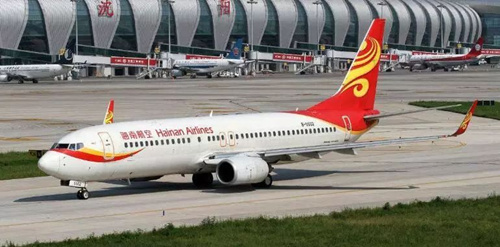Chinese wisdom can contribute to int’l civil aviation legislation

Hainan Airlines, one of the fastest growing international airlines in China, has achieved 25 years of safe operations since it was founded in 1993. Photo: FILE
The Aviation Law Forum held recently in Xi’an, Shaanxi Province, was dedicated to examining the Convention for the Suppression of Unlawful Acts Relating to International Civil Aviation with the theme, “Toward a New Era of Safe, Secure, Coordinated and Green International Civil Aviation.” Scholars of aviation law studies and representatives from aviation regulation institutes were in attendance.
Since the proposal of the Belt and Road (B&R) initiative, civil aviation agencies have tried to provide an integrated solution to the interconnectivity among the countries along its proposed routes. The Convention for the Suppression of Unlawful Acts Relating to International Civil Aviation (hereafter abbreviated as the Beijing Convention) entered into effect in July 2018. As an important part of international aviation security conventions, the Beijing Convention provides a strong international legal basis to safeguard civil aviation security.
Civil aviation plays a significant role in strengthening interconnectivity among nations and improving political and cultural exchanges as well as business and trade cooperation, said Huang Jiefang, director of the Legal Affairs and External Relations Bureau under the UN International Civil Aviation Organization (ICAO). As an official legal document, the Chinese version of the Beijing Convention is another important achievement in achieving uniform legislation in aviation security of international aviation fields, and it provides a new international legal basis for the coordinated and united actions of the international community and for aviation security cooperation and international aviation security governance, Huang said. It highlights the role of international law in safeguarding aviation security by criminalizing terrorist activities and cracking down on unlawful activities relating to civil aviation, Huang said.
Huang also suggested that the system of international aviation security conventions changed significantly during the period from the Tokyo Convention, the first convention on suppressing crimes and unlawful acts relating to aviation security, to the enactment of the Beijing Convention. The Beijing Convention is a milestone of international aviation law because it provides a new system of international legal rules for contemporary aviation security, he said. By deeply studying the key issues surrounding the introduction of the Beijing Convention to Chinese domestic laws, Chinese scholars can promote China’s deep participation in the making of international aviation laws, and thus the world can move toward a new era of safe, secure, coordinated and green international civil aviation, Huang said.
Wang Han, a professor of law from Northwest University of Political Science and Law said that three conventions widely accepted around the world were established in the 1960s and 1970s as international aviation transportation prospered. They were the Tokyo Convention, the Hague Convention and the Montreal Convention, which established the basic structure of the international convention system relating to civil aviation security. However, as aviation transportation has developed, new types of unlawful activities and crimes have emerged, including the use of aircraft as weapons or biological, chemical or nuclear attacks. Against this background, the ICAO held a Diplomatic Conference on Aviation Security in Beijing in 2010, aiming to renew the Hague Convention, the Montreal Convention and related protocols.
Delegates from 76 nations and observers from four international organizations participated in the conference. The Beijing Convention and the Protocol Supplementary to the Convention for the Suppression of Unlawful Seizure of Aircraft (Beijing Protocol of 2010) were passed at that conference.
Lyu Erxue, deputy administrator of the Civil Aviation Administration of China, said that the civil aviation community of China actively participates in international cooperation of civil aviation, and China has approved and joined 26 important multilateral international conventions on civil aviation. In the meantime, the Chinese community of civil aviation has dedicated itself to keeping pace with, learning and studying international civil aviation law. The Beijing Convention and the Beijing Protocol of 2010 show that the international community highly regards the ability and status of the Chinese civil aviation community. The legal practices of the Chinese community can contribute to the international legislation on civil aviation with Chinese wisdom and Chinese experience.
(edited by CHEN ALONG)
